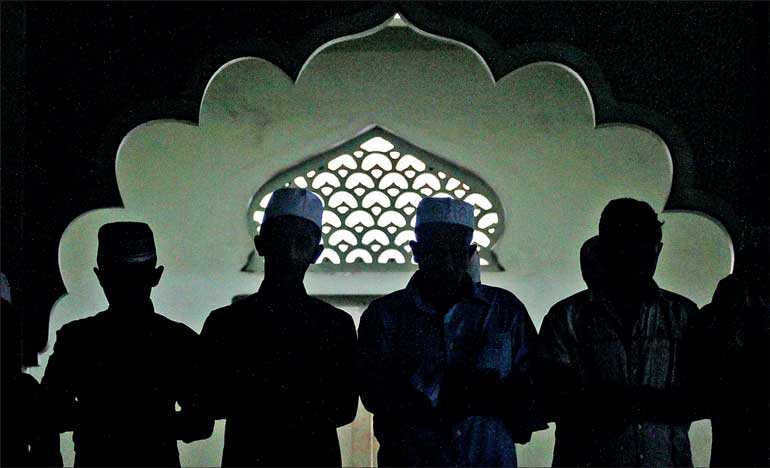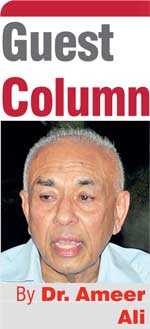Thursday Feb 19, 2026
Thursday Feb 19, 2026
Friday, 13 November 2020 00:00 - - {{hitsCtrl.values.hits}}

No scientist or epidemiologist anywhere in the world has so far proved with solid evidence that coronavirus can spread from buried corona-dead corpses. 
Only in Sri Lanka a so-called committee of health experts belonging to the establishment expressed an opinion that because of the high water level in the ground the virus has the potential to spread if those who died from it are buried. Hence, they recommended indiscriminate cremation, hitting directly at religious sensitivity of Muslims.
No amount of protest from local Muslims or from Muslim organisations abroad, and not even advice from the WHO to the contrary could convince President Gotabaya Rajapaksa and his Government to relent. The President maintains that unless the experts committee shows the green light, he will not budge. This is the strongest demonstration yet of the one-country-one-law mantra.
In the meantime, the Muslim Minister of Justice fails to see the injustice committed to his community, and the Mufti or the chief shepherd preaches his herd how to bury the ashes after cremation. ‘If you cannot change them join them’ appears to be the preferred course of action to these leaders. The community on the other hand is not prepared to listen.
Manna from heaven to Buddhist supremacists
The whole episode has nothing to do with science and epidemiology but with politics. The opinion expressed by the expert committee was manna from heaven to Buddhist supremacists who, since 2009 and especially after the Easter massacre of 2019, are bent on seeking revenge on Muslim community.
These supremacists are a pillar of strength to the Rajapaksa regime. Their ideology of a hegemonic Buddhist Sri Lanka dominates the thinking and philosophy of the professionals in President GR’s Viyath Maga. It is that ideology which is the quintessence of today’s Jathika Chinthanaya.
Only a few days ago, when a rumour was spreading that the Government was about to reconsider its decision to cremate Muslim bodies, an ageing Gunadasa Amarasekera, one of the architects of this ideology, warned the Government of relenting to Muslim demands. A couple of days ago Rev. Gnanasara in his usual anti-Muslim tone also reminded the lawmakers in the Parliament of one-country-one-law.
There is no sign that the virus is going to disappear for at least another couple of years although its spread could be controlled through vaccination. Even then how cheaply and easily Sri Lankans would have access to that vaccine is uncertain because of the country’s financial difficulties. Authorities are already opening the country for business, because Basil Rajapaksa feels that profit should not be allowed to suffer because of public health.
Thus, based on pseudo-science and backed by Jathika Chinthanaya, cremation of Muslim bodies would continue under the pretext of an emergency. If the Mufti continues to preach his compromised solution of Islamically burying the ash, he could win the hearts and minds of the rulers but certainly not of his community.
Ideologically motivated issues
The issue of cremating Muslim bodies and the proposed ban on cow slaughter are ideologically motivated and very soon one may expect Muslim personal laws also to fall under the ideology’s axe. It would be interesting how the Muslim Minister of Justice would handle that issue when it comes before Parliament.
Meanwhile, the protagonists of this ideology would be watching closely at what their ‘predator’ friend China is doing to Uighur Muslims in Xinxiang. Leaked reports show how those Muslims are force-fed with pig meat and their women shaved and the hair is used as raw material for manufacturing industrial products.
Already the Chinese Government has destroyed several mosques and Muslim burial places in the name of development. One could only hope that the situation in Sri Lanka would not descend to that barbaric level. Sri Lanka’s exceptionally successful management of multiculturalism before the colonial period was unique in the entire region of Asia.
What options do Muslims have?
However, what options do Muslims have to avoid further calamities? First of all, they should give up the idea that by going along with the ruling regime they could save their skin and survive peacefully under traumatic conditions. At the same time, there is no guarantee that they will have better prospects by joining the current Opposition, because the SJB and its parent UNP will also eventually fall prey to the current pernicious ideology to capture power.
Therefore, Muslims and for that matter even Tamils should seek a third alternative. It should be an alternative that seeks to bring back democracy with all its innate qualities and preserve the country’s pluralist polity and culture.
Thankfully, there is a significant cluster of saner and influential minds within the majority Sinhala Buddhists, including sections of the Sangha, who are wanting that to happen. It is the task of the Muslim intelligentsia to approach and join hands with them, introduce them to the community and work with them for a better Sri Lanka.
It is not a change that is going to happen soon, but the foundations should be laid now for the future. The populist image of the current regime is bound to suffer in the face of looming economic disaster.
The Muslim community is caught up in the current predicament because of its own ethnic politics. Both the SLMC and ACMC should be dissolved forthwith and the community becomes part of a multi-ethnic, patriotic and democratic political party.
If a ruling government is democratic, treats every community and citizen equally and protects the independence of Judiciary, what does it matter whether Muslims and Tamils or for that matter even Sinhalese are represented in the Legislature by their own men and women or by other community members? It is time to think afresh and outside the circle.
(The writer is attached to the School of Business & Governance, Murdoch University, Western Australia.)